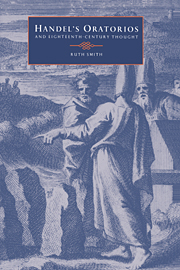Book contents
- Front Matter
- Contents
- Acknowledgements
- Abbreviations
- Introduction
- PART 1 ENGLISH ORIGINS OF ENGLISH ORATORIO
- PART II THE PATRIOT LIBRETTO FROM THE EXCISE BILL TO THE JEW BILL: ISRAELITE ORATORIOS AND ENGLISH POLITICS
- Chapter 8 Political events and political thought
- Chapter 9 Allegorical politics
- Chapter 10 Moral politics
- Chapter 11 ‘Esther’ to ‘Athalia’
- Chapter 12 In time of war
- Chapter 13 Images of government
- Chapter 14 The conflict of public and private interests
- Chapter 15 Coda: the end of Handel's Israelite oratorios
- Appendix I Libretto authors and sources
- Appendix 2 The oratorios and Methodism
- Notes
- Bibliography of sources cited
- Index
Chapter 13 - Images of government
Published online by Cambridge University Press: 22 September 2009
- Front Matter
- Contents
- Acknowledgements
- Abbreviations
- Introduction
- PART 1 ENGLISH ORIGINS OF ENGLISH ORATORIO
- PART II THE PATRIOT LIBRETTO FROM THE EXCISE BILL TO THE JEW BILL: ISRAELITE ORATORIOS AND ENGLISH POLITICS
- Chapter 8 Political events and political thought
- Chapter 9 Allegorical politics
- Chapter 10 Moral politics
- Chapter 11 ‘Esther’ to ‘Athalia’
- Chapter 12 In time of war
- Chapter 13 Images of government
- Chapter 14 The conflict of public and private interests
- Chapter 15 Coda: the end of Handel's Israelite oratorios
- Appendix I Libretto authors and sources
- Appendix 2 The oratorios and Methodism
- Notes
- Bibliography of sources cited
- Index
Summary
THE PRIME MINISTER
James Miller's libretto Joseph and his Brethren, which begins with its hero's entry to the service of Pharaoh, portrays in the character of Joseph a perfect chief minister. It was written after the fall of Robert Walpole, the most powerful chief minister since Wolsey (to whom Walpole was often compared by his detractors). Polemic against Walpole continued well into 1743; government critics demanded that the minister who had been forced to resign should be called to account. Almost nothing came of this, and disillusion with government was deepened among Patriots committed to reform by the apostasy of their leader William Pulteney (see chapter 8). While Miller's libretto was being set by Handel, the king's chief minister was Lord Carteret, whose pro-Hanoverian mind-set enraged patriots of every hue. The long-desired changes of political management altered none of the defects in government and public life of which moral-political writers like Miller complained.
Much of Miller's description of his hero recalls contemporary writing about the desired qualities of a head of government:
phanor He's Egypt's common Parent, gives her Bread;
He's Egypt's only Safety, only Hope;
Whilst Egypt's Welfare is his only Care.
chorus Blest be the Man by Pow'r unstain'd,
Virtue there itself rewarding!
Blest be the Man to Wealth unchain'd,
Treasure for the Publick hoarding!
asenathPhanor, we mention not his highest Glory,
Mark midst his Grandeur what Humility,
The Gift of that great God whom he adores.
(Part II scene 1)- Type
- Chapter
- Information
- Handel's Oratorios and Eighteenth-Century Thought , pp. 304 - 334Publisher: Cambridge University PressPrint publication year: 1995

